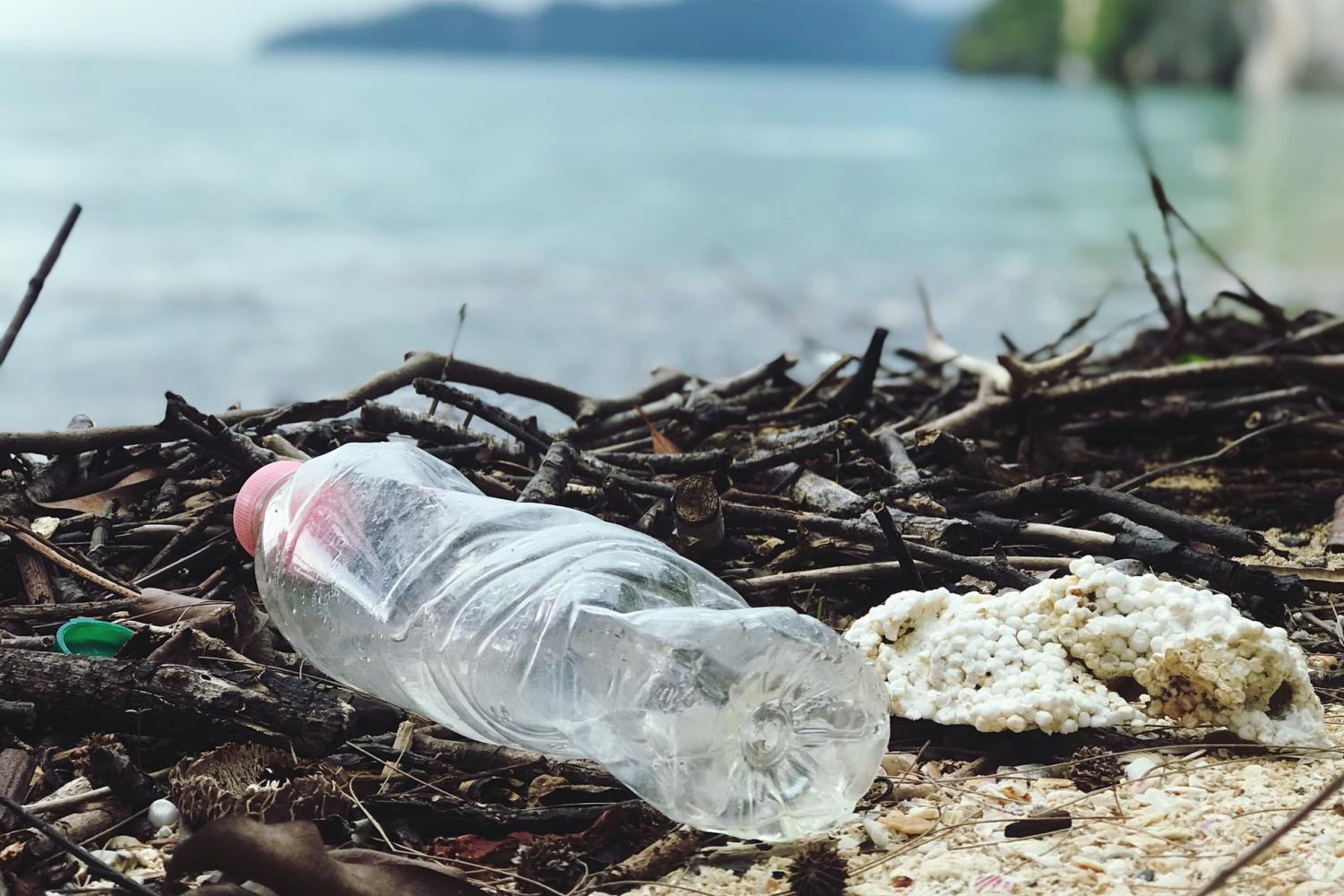
Climate Week is certainly much different this year. Corporate leaders and governments are faced with a new challenge of rebuilding in the wake of COVID-19 while working towards a net-zero and circular economy future; hence the theme of this year’s climate summit. Too often, we’re told to recycle more, or are surrounded with messages and invitations focused on worldwide sustainability projects and clean ups. While these may seem like steps forward towards achieving recycling goals or reducing the consumption of plastic, we must not be naive.
We’re a long way off from a circular economy, says one report
An investigative report recently released by The Changing Markets Foundation exposes missed targets and lack of action by the world’s largest plastic polluting companies. The report analyzed the plastic reduction efforts and voluntary recycling commitments of large global companies including Coca-Cola, Colgate-Palmolive, Danone, Mars, Mondelēz , Nestlé, PepsiCo, Perfetti Van Melle, Procter & Gamble and Unilever.
Over the past decade, these have companies voluntarily committed to ambitious recycling, circular economy, and plastic-eliminating efforts and have joined alliances congruent to these goals. But according to Changing Markets, these same corporations are also contributing to the delay and derailment of efforts to halt plastic reduction.
From Changing Markets’ perspective, companies are doing so through covert lobbying against plastic reduction legislation as well as the misrepresentation of data and distraction tactics. Futile publicized campaigns like beach clean-ups, the funding of research projects, and the promotion of chemical recycling are among the tactics various corporations have practiced to evade their contributions – and therefore their responsibilities - to the global production of plastics.
For example, Mars is part of the Ellen MacArthur Foundation's New Plastics Economy Global Commitment (EMF). This organization launched an initiative, The New Plastics Economy, in 2017 to tackle plastic pollution. The problem with this alliance, alleges Changing Markets, is that it lacks any mechanism to hold companies responsible for missed targets – and therefore there is no accountability or incentive for companies to improve their recycling performance or circular economy progress.
Instead, EMF has discussed technologies such as new developments in chemical recycling – currently one of Mars’ strategies – as among the options to take on plastic pollution. Chemical recycling transforms plastic waste into new plastics or fuel through heat, pressure, and chemicals. Changing Markets, however, dismisses chemical recycling as an effective solution as it insists such a process poses risks to environmental health as the technology releases toxic substances in the atmosphere.
Companies publicize circular economy goals, while launching countermeasures on the sly
Corporate commitments to recycle more must be observed carefully. As companies push recyclable products or commit to long-term circular economy objectives, there is a lack of campaigns or commitments in collecting and sorting these very plastic products. How can we guarantee plastic is recycled when there is no policy or legislation that ensures it will be collected and organized in the first place? More specifically, are companies being impactful if they commit to recycling but don’t support such legislation or have any plans to mandate plastic collection? Voluntary commitments and alliances to causes such as the circular economy are great. Climate Week calls exactly for this – collective, corporate action. But Changing Markets makes the case that such commitments perpetuate ongoing challenges, such as the lack of transparency, ambition and accountability.
In March 2020, Mondelez International joined the New Plastics Economy Global Commitment but according to Changing Markets, it did not disclose details about its plastics footprint. Furthermore, in its 2019 Impact Report, Mondelez did not mention any support for legislation that would regulate plastic collection or targets for recycled content. As stated in the report, supporting legislation that mandates plastic collection, reuse models and deposit return systems are among the key solutions to plastic waste. Such actions help hold companies responsible for the plastic they are distributing across global markets.
In another twist, Changing Markets alleges that some companies are openly investing in producing more plastic. PepsiCo, as an example, is a member of Alliance to End Plastic Waste. Launched in January 2019, this alliance claims consumers are responsible for plastic pollution instead of companies that produce plastic. The alliance and its 47 members have pledged $1.5 billion towards plastic pollution over the next five years with an emphasis on improving infrastructure, technology, education, and cleaning up current plastic waste.
Changing Markets counters that such a public proclamation is actually contradicting what the Alliance’s members have done. According to the report, the Alliance’s members, including PepsiCo, have invested $186 billion between 2010 and 2017 in petrochemical facilities vested in increasing plastic production. As we struggle to eliminate the existing plastic surrounding us, the report brings up a fair question: Is it reasonable to create even more plastic items?
One additional point of criticism that the authors of the Changing Markets report direct at the Alliance is its approach to tackling the global plastics problem. For example, the group notes that the Alliance has worked with an NGO in Africa to launch programs focused on education and clean-ups. But the report alleges that the Alliance’s members produce the same plastics that litter these spaces. Furthermore, Changing Markets claims, “The focus on parks and reserves also conveniently helps to clean up the problem in areas frequented by tourists, without addressing the severe harm posed to communities from toxic dumps of growing plastic waste choking cities across the continent.”
International sustainability projects, investing in research and developing new eco-friendly or plastic-solutions are among the topics of discussion during Climate Week, whether at the official event or during virtual events aligned with this theme. Nevertheless, plastic waste continues to pile up as consumers’ attention is elsewhere.
Harnessing a crisis to boost plastic production
One of the report’s most pointed criticisms is its allegation that petrochemical companies are using personal protective equipment (PPE) as an excuse to expand capacity at their manufacturing plants. However, Changing Markets claims PPE makes up far less of what companies are producing as opposed to disposable plastic packaging.
“Oil, gas and petrochemical companies are banking on plastic production as a lifeline amid the declining profitability of fossil fuels,” says the report. “They are desperate to ensure its future, and unbind it from regulatory shackles, wherever they can. The industry’s rapid lobbying in response to COVID-19 shows its readiness to co-opt crises, manipulate harried politicians and exploit public fears to continue smothering the world with plastic.”
Editor's Note: In response to this piece, the Ellen MacArthur Foundation issued the following statement to TriplePundit:
"The Ellen MacArthur Foundation campaigns publicly and vigorously for many of the actions that the Changing Markets Foundation argues for in its report. We have called consistently for businesses to eliminate unnecessary plastic and shift from single-use to reuse models, while increasing transparency on their plastic footprint.
"At the same time, recognising voluntary industry action alone is not enough, we have called for a binding global agreement on plastics and the roll-out of EPR or equivalent schemes globally. Thanks to the Global Commitment we have seen, for the first time, more than 200 companies set common 2025 targets on plastics. Every Global Commitment signatory had to raise their ambitions in order to join and those who were unable to meet the barriers to entry have not been allowed to join. All business signatories must report publicly on the same targets, using the same metrics and definitions. 2019 was the first time that much of this data was gathered and made public.
"In November we are publishing our second progress report, which will allow for comparisons against last year’s data and show where progress was and wasn’t made. This transparency to media, investors, NGOs and the public is essential to accountability. We believe these are vital steps towards solving the plastic pollution crisis.
"We agree that voluntary agreements alone are not enough to solve plastic pollution and we believe governments and policy makers have a crucial role to play. It is critical that we also continue to work with companies, who have both the power and the responsibility to make changes to which materials and business models are used at scale. Both are necessary."
Sign up for the weekly Brands Taking Stands newsletter, which arrives in your inbox every Wednesday.
Image credit: Catherine Sheila/Pexels

Rasha is a freelance journalist with experience in external communications and publicity. She is a Ryerson School of Journalism graduate and has worked on various media and communication campaigns in film, home development and the nonprofit sector. Rasha is passionate about storytelling for impact, whether she focuses on social enterprise, transforming our food system or making the business world more inclusive.














